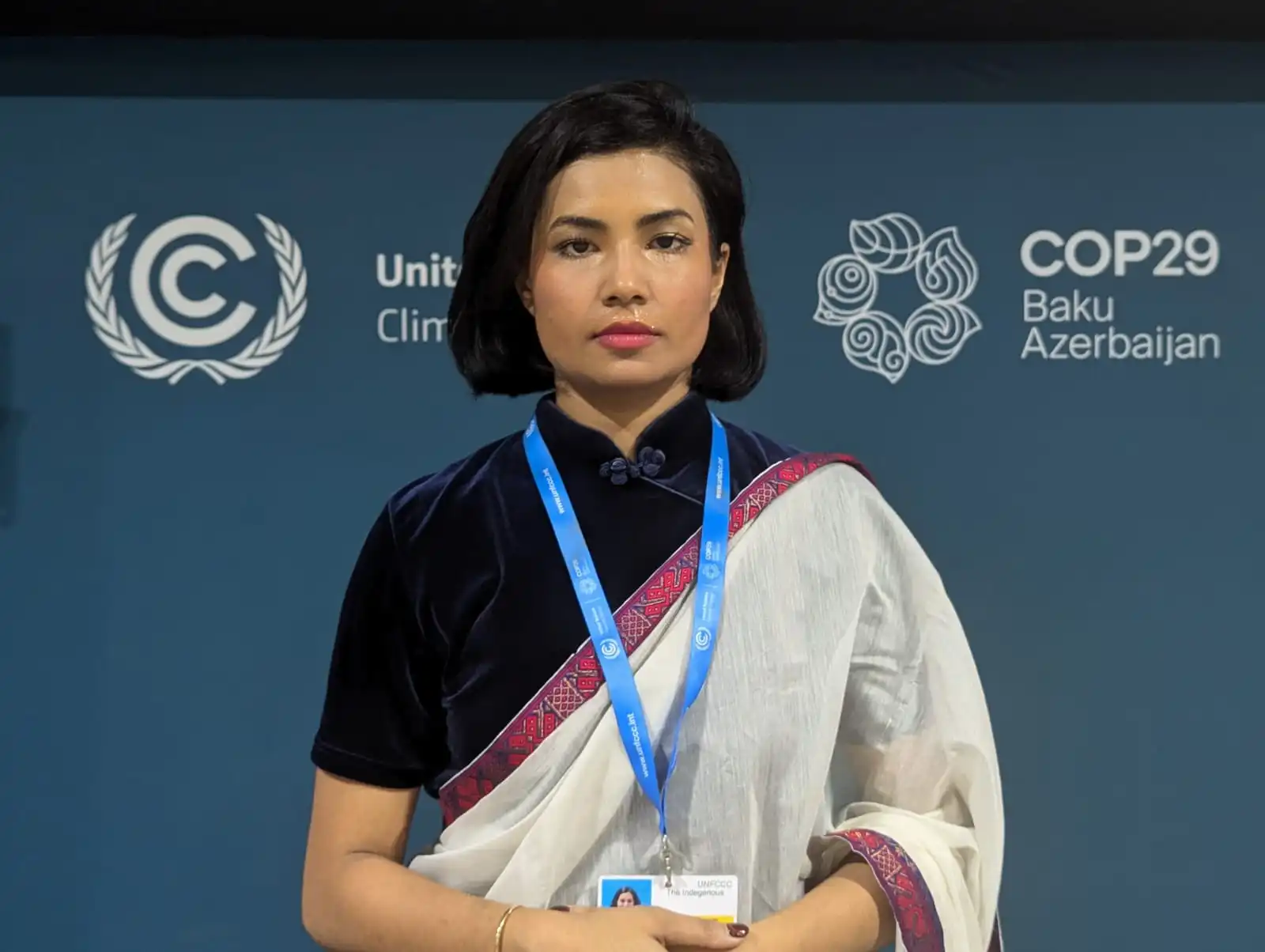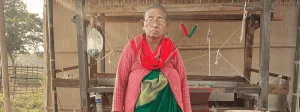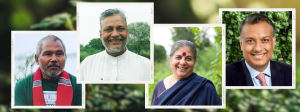(December 29, 2024) Bhavna Choudhury remembers how, on Teacher’s Day, children didn’t come to class with pens or bouquets. Instead, they arrived with their hands full of Lao, Ou-Tenga, Kordoi, all grown in their own backyards. Growing up in a small indigenous community in Assam, daily life was about community, defined by “ancient knowledge of our forests and the ability to live sustainably with them,” she tells Global Indian. However, she also saw the dark side to being indigenous – watching as tribes in Assam and the North East maligned as terrorists as they fought for their rightful place, and to have a say in decisions that affected their land and future.
Like many others, she left home, and headed abroad. As a student at Georgia Tech, she learned to navigate an unfamiliar culture that prized speed, efficiency, and mass production—values at odds with the slower, sustainable rhythms of her upbringing. However, at École Polytechnique in France, she found space to reconnect with her roots. Surrounded by thinkers and activists, Bhavna found clarity: the knowledge of her people was not a relic of the past but a vital key to addressing the climate crisis.
Today, as the founder of The Indegenous, a UN-accredited NGO, Bhavna works to amplify the voices of indigenous communities, fighting for their rightful place in decisions that affect their land and future. Whether advocating for policy change on global stages or working directly with communities to preserve biodiversity, Bhavna’s work is rooted in the values that defined her childhood in Assam—values she now fights to protect for future generations.

Bhavna Choudhury, founder, the Indegenous
Origins in Assam
Growing up in Assam, Bhavna Choudhury witnessed firsthand how Indigenous people were labelled terrorists simply for protecting their lands and seeking the right to nourish and sustain their communities. “In Assam, we define community and culture through two things – our food and our language. Unlike the rest of India, casteism is not prevalent, and what makes us Assamese is our strong ties to our land. In Assam, our traditional communities, who live in tandem with nature, are defined by ancient knowledge of our forests and the ability to live sustainably with them,” she reminisces.
She went to Maria’s Public School and Sarala Birla Gyan Jyoti in Guwahati, which are CBSE schools that encourage a global perspective. “We were one of the first children’s delegations to the UNIS-UN model UN in New York in 2009 so the culture of wanting to make an impact was instilled in me as a teenager,” Bhavna says. “It paved the way for my education abroad,” she adds.
Globe Calling
Bhavna Choudhury left India as an 18-year-old and was thrown into global value chains in the ‘civilised’ world, where she struggled to assimilate into a world defined by consumerism. “From supermarket aisles, where there were more options for processed foods in plastic packaging, and where organic (in my head – normal) food had a premium. It left me with years of internal struggle as I tried to assimilate in what was supposed to be a progressive world,” she says.
Consumer-driven neoliberalism was a culture shock. “It was never the big picture or the big ideas that shaped me, it was always the little things and the stories that made me into who I am today,” she admits. She studied industrial engineering at Georgia Tech, and was constantly searching for technical, mathematical answers to make processes better. “Just in Time” engineering and the constant pressure to keep up with competition. “I went from the “Land of the Lahe Lahe” (translated to slow slow) to high-tech 3D printing labs and 400-capacity lecture halls. Engineering wasn’t something that was about memorizing formulas anymore; it was about creative ways to make things better,” she adds.
View this post on Instagram
French Connection
From the US, Bhavna Choudhury headed to France to study at L’École Polytechnique. The experience was a gamechanger. French education was about critical thinking and looking at all sides of the picture. “I was taught by Phillipe Tibi, who currently serves as an economic advisor to the French President and followed the legacies of Nobel Prize winners like Alain Aspect, Gerard Moreau, and Jean Tirole,” she says. Being surrounded by people whose impact went beyond their jobs, with a deep respect for military values like honour, respect and duty was what lead me to think of my own roots,” she says.
Climate activism was strong in Paris at the time, with movements like Extinction Rebellion Fridays for Future being led by children. These fiery young activists weren’t afraid to cause havoc on the streets to demand accountability from the powers that be about collective futures and the climate crisis. “It showed how much power truly lies in our hands. When school kids refused to attend classes and showed up day after day at the parliament across Europe, it showed the true power of the internet to mobilize and create real change. The Climate Crisis became a political issue in front of my eyes,” Bhavna says.
“It was impossible for me not to think of my own people and look at the direct effects—worsening floods, more extreme heatwaves, rising food prices due to crop failure—and not do something about it. Today, the West puts a premium on everything that is supposed to be a basic natural right—the right to clean air, the right to liveable habitats, the right to organic food,” she says.
Giving a Voice
Choudhury joined the activists, and joined the global conversations around climate change and social welfare. She worked at the Stockholm+50 preparatory meeting at the UN, GGGI, British Ministry of Environmental Affairs, COP 29, and Indigenous Caucus and Focal Working Group for Indigenous Peoples at the United Nations. She wanted to do more, though, but struggled to move beyond mere advocacy. “Navigating the way that institutions recognise topics and their interests in them is a challenge I personally had to overcome,” she says. Moreover, she found that even in global forums like the UN, indigenous voices are sidelined, and although they are included, are largely tokenised. Women’s and indigenous issues were usually reserved for the end, when the decision makers had already left.
In 2021, driven by the need to preserve indigenous knowledge and challenge systemic erasure, Bhavna founded The Indegenous, a research-driven organisation operating like a think tank. Even so, it has been a challenge, and direct access funding remains less than 1.9% of the total budget from major donors like the Green Climate Fund. “There are many barriers to being in spaces that feel like echo chambers – where indigenous peoples from different parts of the world network with each other and are unable to bridge that gap towards institutional funding and equity access. This must change,” Bhavna asserts.

Bhavna Choudhury
The global indigenous caucus is trying very hard to promote young, indigenous changemakers. At the global level, indigenous peoples have asked for free, prior, and informed consent – the bare minimum, she says, when it comes to infrastructure projects and net zero ambitions. “There is no consensus on tackling the issue and the global community is moving away from climate consensus to a more divided world,” she rues.
Native Impetus
Her work is to make the case for indigenous people and is working for larger representation of civil society, where they are not just tokenised but rather considered as equals on the negotiating table. “It truly scares me that India in the next twenty years is going to become largely unlivable. I see India changing at unimaginable speed, and we mustn’t forget our own values and our ways of life. It is predicted that the home of 1.45 billion people will become uninhabitable in my lifetime—that my children either must migrate or live in terrible conditions because my generation didn’t do anything about it,” she says.
In 2025, her team is planning a very large campaign to mobilise youth and women’s networks to advocate for 10% minimum land coverage on private properties as a pledge. “And we hope to address some of the larger political problems with solutions. We are working with more and more ground-based indigenous communities to promote our products, improve our livelihoods, and embrace the biodiversity of our blessed regions,” she concludes.
- Follow The Indegenous on Instagram.
Read a similar story of Dr. Abraham George, homecoming for change.




